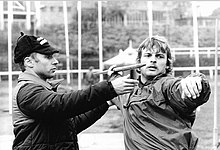Decathlon
![]()
Dekathlon is a redirect to this article. For Decathlon see there.
![]()
The title of this article is ambiguous. See also: Decathlon - Festival Des Politischen Liedes 1970-1980.
The decathlon (also Dekathlon, from Greek δέκα déka 'ten' and ἄθλος áthlos or ἄθλον áthlon 'feat'; English decathlon) is a sporting athletics competition in which ten individual competitions in various disciplines are held in the form of an all-around within two days. Their results are converted according to a points table, which is based on the respective world record; the valid world record in each individual discipline is set at around 1200 points. The winner is the athlete with the highest point total from all ten partial disciplines. Decathlons are held at international championships only by male athletes in the age groups youth, junior and men with the same disciplines and order. The four running, three jumping and three throwing disciplines require great versatility and endurance of the athletes. Therefore, the decathlon is also called the supreme discipline of athletics.
The ten individual disciplines:
- First day: 100-meter run, long jump, shot put, high jump, 400-meter run.
- Day two: 110-meter hurdles, discus throw, pole vault, javelin throw, 1500-meter run.
The decathlon with these individual disciplines has been part of the Olympic Games since 1912.
As of 2018, the decathlon is only held for men at international highlights. It is only since the beginning of 2005 that a world record for women has been officially held by World Athletics, as women's sports traditionally include the heptathlon.
.jpg)
110-meter hurdles at the all-around meeting in Götzis, May 2017
History
As a pentathlon, the all-around was part of the Olympic Games of antiquity, but was not yet practiced in the formative period of modern athletics, from about 1860. At the Olympic Games in 1904 an all-around decathlon took place. The sequence of disciplines was already very similar to today's decathlon, which was introduced at the Olympic Games in 1912.
The selection of disciplines and the order has remained unchanged since then.
The first decathlons according to these rules were held in 1911. On October 15, a decathlon with three participants took place as a test for the 1912 Olympic Games in Stockholm, which was held on one day. At the same time, the 1st decathlon championship of the German Athletics Department (DSBfA; forerunner of the German Athletics Association) took place in Münster. The winner in Münster was Karl Halt (5060 points).
The first Olympic decathlon in 1912 was split over three days due to the large number of participants.
The overall result of a decathlon is determined according to the scoring table. The scoring table has been changed several times; there are tables from 1912, 1920, 1936, 1952, 1964 and 1985. In the process, the weighting of the individual disciplines was also changed, so that in the statistics earlier best performances often result in a higher score than later performances when converted later.
Several decathletes of the early days later became well-known as sports officials: Avery Brundage (1887-1975), later president of the International Olympic Committee, competed in the decathlon at the 1912 Olympics (abandoned) and finished sixth in the pentathlon. The 1912 Olympic eighth in the decathlon, Karl Halt (later Karl Ritter von Halt; 1891-1964), became Reichssportführer under National Socialism and was later president of the National Olympic Committee in the Federal Republic.
The decathlon is one of the last two men's disciplines (along with 110-meter hurdles) not held for women at international highlights (as of 2018); instead of the decathlon, there is a heptathlon for women. Women's decathlons have been held since 2004, and World Athletics registers decathlon world records for women.
The most famous all-around event of the season is the Götzis all-around meeting at the end of May/beginning of June. Three world records were set here, in 1980 and 1982 by the Briton Daley Thompson and in 2001 by the Czech Roman Šebrle. In the world best list of the 50 best decathletes there are twelve results from Götzis (as of June 2012).
Since the beginning of the 1990s, so-called all-man decathlons have been held. They follow the normal structure of a decathlon, but deviate from it by some facilitations, such as lower hurdles and lower initial heights for the jumps, and usually offer on the part of the organizer a supervision and guidance that allows even beginners to participate successfully.

Everyday training of a decathlete (1985)
Milestones
Men
(in brackets: converted number of points according to the table valid since 1985)
- First registered benefits:
- 6903,92 points (5386) Hugo Wieslander, (SWD), 15 October 1911 in Gothenburg
- 6423 Points (5060) Karl Halt (GER), October 15th 1911 in Münster
- First official world record: 7485.61 points (6162) Aleksander Klumberg-Kolmpere (EST), 16/17 September 1922
- First decathlon over 7000 today's points, 8790.46 points (7147) Hans-Heinrich Sievert (GER), 7/8 April 1934
- First decathlon over 8000 today's points: 9121 (8010) Yang Chuan-Kwang (TAI), 27/28 April 1963
- First decathlon over 8500 today: 8617 points (8634) Bruce Jenner (USA), 29/30 July 1976
- First decathlon over 9000 today's points: 9026 Roman Šebrle (CZE), 26/27 May 2001 at the all-around meeting Götzis
Women
- First decathlon: 4/5 September 2004 in Valga (winner: Anu Teesaar (EST), 6411 points)
- First world record: 8358 points Austra Skujytė (LTU), 14/15 April 2005.
Search within the encyclopedia